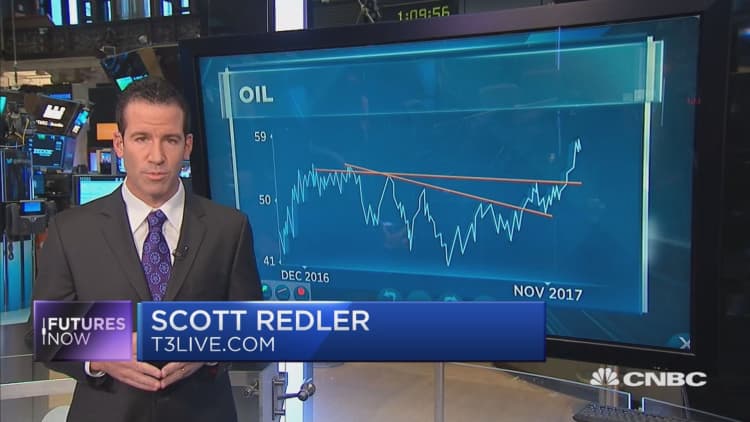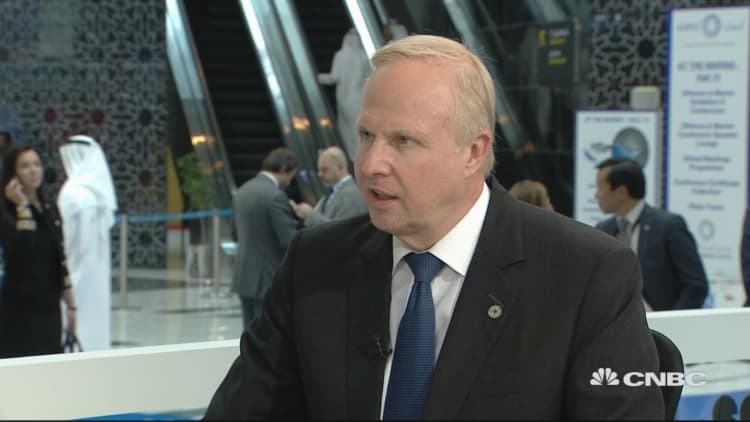Oil prices held steady in a tight range Monday, with support from Middle East tensions and record long bets by fund managers balanced by rising U.S. production.
U.S. West Texas Intermediate (WTI) crude ended Monday's session up 2 cents to $56.76. Brent crude futures fell 29 cents to $63.23 a barrel by 2:24 p.m. ET (1824 GMT), having gained 14 percent so far this month.
Middle East tensions have supported the market, despite concerns that output could rise further.
"The rise by Saudi Arabia to produce more than 10 million barrels per day would have registered more," said John Kilduff, partner at Again Capital. "This is a new level of geopolitical risk," he said. Additionally, the market has less supply overhang than it did a year ago, he said.
On the supply side, tensions in the Middle East raised the prospect of disruptions, traders said. A purge this month of Saudi Arabia's leadership by Crown Prince Mohammed bin Salman is one of the key factors raising concerns about political stability of the region's largest oil producer.

Other regional concerns include war in Yemen and growing tensions between Saudi Arabia and Iran is a concern to investors too.
Bahrain said over the weekend that an explosion that caused a fire at its main oil pipeline on Friday was caused by sabotage, linking the attack to Iran, which denied any role. Saudi Aramco said on Monday that it had fully resumed pumping crude oil to Bahrain after the explosion, which forced the pipeline's closure.
Oil Minister Jabar al-Luaibi said Iraq plans to increase production from oilfields in Kirkuk to one million barrels per day, the ministry's spokesman said on Monday. Exports from oilfields in Kirkuk have been on hold since Iraqi forces took back control of them from the Kurds last month.
Traders said crude prices were well supported as output cuts led by the Organization of the Petroleum Exporting Countries and Russia have contributed to a reduction in excess supply that had dogged markets since 2014.
OPEC forecast higher demand for its oil in 2018 and said its production-cutting deal with rival producers was reducing excess oil in storage, pointing to an even tighter global market next year. However, it also pointed out that Saudi output had risen above 10 million barrels per day.
The level of inventories held by industrialized above the five-year average "has fallen by more than 50 percent in 2017, with inventories currently at around 160 million barrels," consultancy Timera Energy said.
"If current trends continue, inventories are likely to return to the five-year average at some stage in 2018," it said, adding that strong demand had also helped reduce the glut.

OPEC has sought to push stocks to the five-year average. The group raised its forecast on Monday for demand for its oil in 2018 and said its deal with other producers to cut output was reducing excess oil in storage, potentially pushing the global market into a deficit next year.
Hedge funds increased holdings of Brent futures and options in the latest week, extending their bet on a rally to the highest on record. Managers now hold net long positions equivalent to nearly 544 million barrels of oil.
"Overall, there are a few reasons for confidence — compliance from OPEC — and it seems likely they'll extend the cut," said Jasper Lawler, a market strategist at London Capital Group, referring to the output deal due to expire in March.
The United Arab Emirates' energy minister on Monday said he expects OPEC and non-OPEC countries to extend their deal at a meeting on Nov. 30.
U.S. producers added nine oil rigs last week, the biggest jump since June, raising the count to 738, energy services firm Baker Hughes said on Friday.
The rig count fell in August, September and October, but last week's rise was the second in three weeks, indicating that the U.S. oil industry was comfortable operating at current prices.
— CNBC's Tom DiChristopher contributed to this story.

